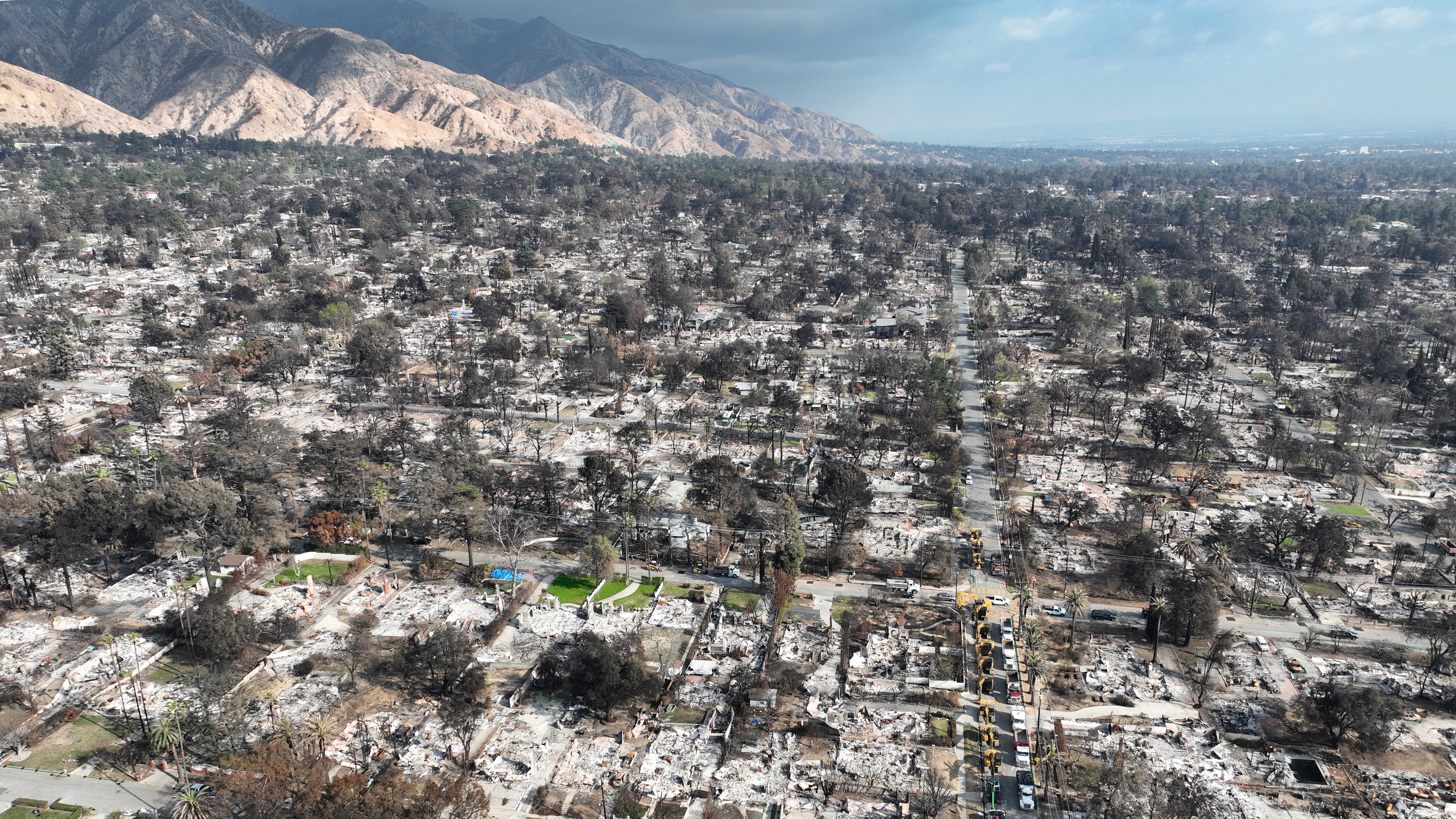Scared About Climate Change? Change the Way You Invest
Climate change is hitting the U.S. hard, and while positive action from the White House may now be unlikely, individuals can use their wallets to hit back.


Profit and prosper with the best of Kiplinger's advice on investing, taxes, retirement, personal finance and much more. Delivered daily. Enter your email in the box and click Sign Me Up.
You are now subscribed
Your newsletter sign-up was successful
Want to add more newsletters?

Delivered daily
Kiplinger Today
Profit and prosper with the best of Kiplinger's advice on investing, taxes, retirement, personal finance and much more delivered daily. Smart money moves start here.

Sent five days a week
Kiplinger A Step Ahead
Get practical help to make better financial decisions in your everyday life, from spending to savings on top deals.

Delivered daily
Kiplinger Closing Bell
Get today's biggest financial and investing headlines delivered to your inbox every day the U.S. stock market is open.

Sent twice a week
Kiplinger Adviser Intel
Financial pros across the country share best practices and fresh tactics to preserve and grow your wealth.

Delivered weekly
Kiplinger Tax Tips
Trim your federal and state tax bills with practical tax-planning and tax-cutting strategies.

Sent twice a week
Kiplinger Retirement Tips
Your twice-a-week guide to planning and enjoying a financially secure and richly rewarding retirement

Sent bimonthly.
Kiplinger Adviser Angle
Insights for advisers, wealth managers and other financial professionals.

Sent twice a week
Kiplinger Investing Weekly
Your twice-a-week roundup of promising stocks, funds, companies and industries you should consider, ones you should avoid, and why.

Sent weekly for six weeks
Kiplinger Invest for Retirement
Your step-by-step six-part series on how to invest for retirement, from devising a successful strategy to exactly which investments to choose.
It’s no longer climate change — we live in a changed climate. The consequences are evident — the Los Angeles wildfires are just one example — but there is hope. Now is the time to mend the world we live in for ourselves and future generations. While you may be feeling helpless, there are steps you can take to make a positive impact today. This article will share the cost of inaction and how you can make a difference.
According to NASA, 2024 was the warmest year on record. The agency said: “For more than half of 2024, average temperatures were more than 1.5 degrees Celsius [about 2.7 degrees Fahrenheit] above the baseline, and the annual average, with mathematical uncertainties, may have exceeded the level for the first time.” The benchmark set by the Paris Agreement as a level that should not be exceeded is 1.5 degrees Celsius — a 2-degree Celsius increase (3.6 degrees Fahrenheit) could result in catastrophic consequences.
Alarmingly, on January 20, President Donald Trump withdrew the United States from the Paris Agreement. This is troubling for many reasons, one of which is that the United States is one of the world’s top producers of carbon emissions. While individual states and businesses retain the ability to pursue climate change independently, the absence of federal leadership creates a substantial setback for the progress that has been made.
From just $107.88 $24.99 for Kiplinger Personal Finance
Become a smarter, better informed investor. Subscribe from just $107.88 $24.99, plus get up to 4 Special Issues

Sign up for Kiplinger’s Free Newsletters
Profit and prosper with the best of expert advice on investing, taxes, retirement, personal finance and more - straight to your e-mail.
Profit and prosper with the best of expert advice - straight to your e-mail.
Hard to ignore the impact
Trump's decision comes at a time when the devastating impact of climate change has become increasingly impossible to ignore. The unprecedented amount of destruction wrought by the California wildfires and Hurricane Helene has left those impacted reeling. Pacific Palisades has been all but burned off the map, and Asheville, N.C., will take years to clean up and rebuild. But it’s not like these consequences weren’t predicted. According to the Royal Institution, as early as 1824, Joseph Fourier theorized the greenhouse effect. Almost 150 years later, meteorologist John Sawyer published a paper in Nature predicting the rate of global warming from an excess of carbon dioxide in the atmosphere from burning fossil fuels.
The Intergovernmental Panel on Climate Change was established in 1988 — the same year that James Hansen testified before Congress. In that hearing, Hansen said that he was “99% certain” that pollution was already warming the earth, causing droughts and heat waves. Lawmakers had to “‘stop waffling’ and deal with the problem, he vented to reporters as he left the Senate chamber,” according to a Columbia Magazine article.
Since then, there have been 29 COP global climate conferences, the Kyoto Protocol, the Paris Agreement and numerous other attempts to rein in emissions. Yet over that time, the concentration of carbon dioxide in the atmosphere has continued to grow at a 22% pace, from 349 parts per million to 426 parts per million and rising. With the United States’ decision to leave the Paris Agreement, we can expect this number to grow at exponential rates.
As early as 1977, Exxon scientists knew what was happening with emissions and the potentially catastrophic results but unapologetically continued producing fossil-fuel-based energy. A 2023 report in Science examined the accuracy of Exxon’s scientific projections and determined that they were quite accurate. “What we found is that between 1977 and 2003, excellent scientists within Exxon modeled and predicted global warming with, frankly, shocking skill and accuracy only for the company to then spend the next couple of decades denying that very climate science,” said Geoffrey Supran, lead author.
And here we are, dealing with the impacts of a changed climate so oil companies and other emissions-intensive industries could make billions of dollars in profits. It’s time to stop making excuses for corporate greed and place the blame for these unnatural disasters at the feet of those who enabled them to happen. It’s time to shun polluting industries for their refusal to accept their responsibility and make meaningful changes.
Investing (and divesting) for change
Here are four things you can do today to make a change:
1. Divest from fossil fuels and other harmful industries.
Investing is like voting with your wallet. If enough of us divest from fossil fuels, that could be the wake-up call these companies need. It will also free up your money to invest in forward-looking companies that are doing good for the planet.
2. Align your investment with your values.
Investing in sustainable companies that are innovators, the ones that are developing solutions to our greatest challenges and leading us into a cleaner, more resource efficient and more equitable economy. Don’t be fooled by funds with ESG in the name; it’s critical to look under the hood of your investments to make sure they aren’t greenwashed.
3. Understand the importance of resilience and innovation in a changed-climate world.
My new definition of sustainable, resilient and innovative (SRI) investing integrates the three most important elements of the new economy. We cannot look only to reduce our impact via sustainability, but, in light of the hurricane devastation in Asheville and the fires in Los Angeles, we must invest in resilience and adaptation because of the changed climate. Innovation is the glue that holds these together and provides opportunity.
4. Hold the bad actors accountable.
Although Trump took the U.S. out of the Paris Agreement, there are policymakers and legislation that are prioritizing climate action, and you can support them and their initiatives to hold polluting industries accountable.
It’s time for our investment portfolios to evolve to reflect a new economy — one that nurtures solutions to reduce the impacts of the changing climate and be resilient and adaptive to the changed climate events impacting us. One that places the health and well-being of all living things on equal footing with profit. If it’s not blatantly obvious that action needs to be taken now, I’m not sure what additional evidence is needed. The Cree proverb is appropriate: "When the last tree has been cut down, the last fish caught, the last river poisoned, only then will we realize that one cannot eat money.”
Related Content
- Do Green Credit Cards Deliver?
- 9 Best Green Energy Stocks to Buy Now
- Four Sustainable Investments That Could Have a Positive Impact
- Committed to Sustainable Investing? Three Questions to Ask Your Adviser
- The Majority of ESG Funds Are Not Sustainable. Here’s Why.
Profit and prosper with the best of Kiplinger's advice on investing, taxes, retirement, personal finance and much more. Delivered daily. Enter your email in the box and click Sign Me Up.

Peter Krull is the Partner and Director of Sustainable Investments at Earth Equity Advisors, a Prime Capital Financial Company, and has been specializing in sustainable, responsible and impact (SRI) investing for over 20 years. He earned the Chartered SRI Counselor® from the College for Financial Planning. In June 2024, Peter was recognized by InvestmentNews as the ESG/Responsible Investing Advisor of the Year for 2023 (no compensation was given). Peter has won two ThinkAdvisor Luminaries Awards: Thought Leadership and Education for 2021 (awarded in November 2021; no compensation was provided) and the Advisors With Heart in 2024 (awarded in December 2024; no compensation was provided).
-
 Nasdaq Leads a Rocky Risk-On Rally: Stock Market Today
Nasdaq Leads a Rocky Risk-On Rally: Stock Market TodayAnother worrying bout of late-session weakness couldn't take down the main equity indexes on Wednesday.
-
 Quiz: Do You Know How to Avoid the "Medigap Trap?"
Quiz: Do You Know How to Avoid the "Medigap Trap?"Quiz Test your basic knowledge of the "Medigap Trap" in our quick quiz.
-
 5 Top Tax-Efficient Mutual Funds for Smarter Investing
5 Top Tax-Efficient Mutual Funds for Smarter InvestingMutual funds are many things, but "tax-friendly" usually isn't one of them. These are the exceptions.
-
 Nasdaq Leads a Rocky Risk-On Rally: Stock Market Today
Nasdaq Leads a Rocky Risk-On Rally: Stock Market TodayAnother worrying bout of late-session weakness couldn't take down the main equity indexes on Wednesday.
-
 Quiz: Do You Know How to Avoid the 'Medigap Trap?'
Quiz: Do You Know How to Avoid the 'Medigap Trap?'Quiz Test your basic knowledge of the "Medigap Trap" in our quick quiz.
-
 5 Top Tax-Efficient Mutual Funds for Smarter Investing
5 Top Tax-Efficient Mutual Funds for Smarter InvestingMutual funds are many things, but "tax-friendly" usually isn't one of them. These are the exceptions.
-
 Why Invest In Mutual Funds When ETFs Exist?
Why Invest In Mutual Funds When ETFs Exist?Exchange-traded funds are cheaper, more tax-efficient and more flexible. But don't put mutual funds out to pasture quite yet.
-
 We Retired at 62 With $6.1 Million. My Wife Wants to Make Large Donations, but I Want to Travel and Buy a Lake House.
We Retired at 62 With $6.1 Million. My Wife Wants to Make Large Donations, but I Want to Travel and Buy a Lake House.We are 62 and finally retired after decades of hard work. I see the lakehouse as an investment in our happiness.
-
 Social Security Break-Even Math Is Helpful, But Don't Let It Dictate When You'll File
Social Security Break-Even Math Is Helpful, But Don't Let It Dictate When You'll FileYour Social Security break-even age tells you how long you'd need to live for delaying to pay off, but shouldn't be the sole basis for deciding when to claim.
-
 I'm an Opportunity Zone Pro: This Is How to Deliver Roth-Like Tax-Free Growth (Without Contribution Limits)
I'm an Opportunity Zone Pro: This Is How to Deliver Roth-Like Tax-Free Growth (Without Contribution Limits)Investors who combine Roth IRAs, the gold standard of tax-free savings, with qualified opportunity funds could enjoy decades of tax-free growth.
-
 One of the Most Powerful Wealth-Building Moves a Woman Can Make: A Midcareer Pivot
One of the Most Powerful Wealth-Building Moves a Woman Can Make: A Midcareer PivotIf it feels like you can't sustain what you're doing for the next 20 years, it's time for an honest look at what's draining you and what energizes you.